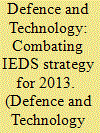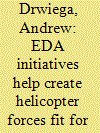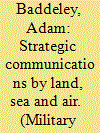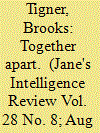| Srl | Item |
| 1 |
ID:
130015


|
|
|
| 2 |
ID:
102251


|
|
|
| 3 |
ID:
113038


|
|
|
|
|
| Publication |
2012.
|
| Summary/Abstract |
This paper analyses the growing involvement of the European Defence Agency (EA) in the field of space, suggesting that this is symptomatic of the greater importance now being placed on military space by the European Union. It charts the history of the agency in general and its role in space in particular, delineating the many synergetic relations it has with other space-related institutions at EU level. It argues that EDA is as much a response to socioeconomic as strategic considerations, and that it acts to protect European competitiveness in the arms field, thereby highlighting the rising significance of EU military space policy for European security and military institutions.
|
|
|
|
|
|
|
|
|
|
|
|
|
|
|
|
| 4 |
ID:
114605


|
|
|
|
|
| Publication |
2012.
|
| Summary/Abstract |
This article seeks to return to the question of an EU military capability
and assesses the organisations capacity for military action through an
analysis of the work ongoing in the European Defence Agency and the
prospects for practically utilising Permanent Structured Cooperation. It
highlights that the introduction of Permanent Structured Cooperation
can be seen as an opportunity for the EU Member States to ?nally
begin to address their capability gaps. Whether signi?cant change actually materialises will depend upon how such a mechanism is implemented in practice. Several factors pose major challenges: lack of
suf?cient political will to practically employ the Battlegroups, static or
declining defence budgets, unwillingness among the Member States to
pool capabilities and the lack of a fully ?edged European strategic culture. By applying the concept of strategic culture this article seeks to
analyse these complex dynamics and uncover the possibilities for bringing a new impetus behind defence cooperation within the Common
and Security Defence Policy.
|
|
|
|
|
|
|
|
|
|
|
|
|
|
|
|
| 5 |
ID:
154467


|
|
|
|
|
| Summary/Abstract |
To cope with increasing air traffic congestion, the European Union launched the Single European Sky in the early 2000s, intending to reform the European airspace which, at that time, was still fragmented by national frontiers. However, this has not been a purely civilian task, as military air transport is likewise affected. In fact, NATO has been concerned by the challenges facing the European Air Traffic Management environment due to the growing commercial aviation since its early days. For this, the European Defence Agency has been tasked to coordinate military views, thus opening a window of opportunity for EU–NATO relations. Both organisations promoting close coordination between the users of civilian and military airspace have built direct contact with each other. While examining how NATO and the EU are shaping their informal cooperation in this sector, the article considers the airspace community of users as a configuration of relations where inevitable inter- and intra-institutional power play is involved to reform the European airspace.
|
|
|
|
|
|
|
|
|
|
|
|
|
|
|
|
| 6 |
ID:
109283


|
|
|
| 7 |
ID:
095822


|
|
|
| 8 |
ID:
162501


|
|
|
|
|
| Summary/Abstract |
Coordinating defence-industrial relations towards harmonising and facilitating procurement policies, production processes and the joint operability of their member-states’ national defence sectors, International Armaments Organisations (IAOs) play an important role in armaments cooperation. How can we explain their institutional development? Existing literature tackles this question using International Relations theories to mid-range theories of institutions and integration. However, they adopt overly state-centric viewpoints, assume actor interests as given, and disregard the changes in the global economic landscape that constitute the backdrop of armaments cooperation. In response, we shift the focus onto a key group of actors: the defence firms. Using a Neo-Gramscian Historical Materialist approach, we investigate how the globalisation of the defence market has created a transnational defence-industrial class in Europe, and demonstrate how its economic interests have fundamentally shaped the institutional frameworks of European IAOs. We focus on the Organisation for Joint Armaments Cooperation (OCCAR) and the European Defence Agency (EDA) to illustrate our argument. Our conclusions have implications for the study of armaments cooperation, particularly highlighting how the economic nature of this policy domain necessitates a closer look at the global and regional production relations, and the agency of the defence firms.
|
|
|
|
|
|
|
|
|
|
|
|
|
|
|
|
| 9 |
ID:
149650


|
|
|
|
|
| Summary/Abstract |
Aside form economic and political consequences, the UK's vote to leave the EU will have an impact on defence and security co-operation. Brooks Tigner assesses the implications for the EU and NATO. Benoit Gomis considers the ramifications for France-UK relations.
|
|
|
|
|
|
|
|
|
|
|
|
|
|
|
|